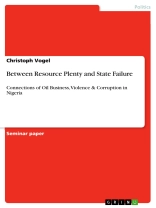Seminar paper from the year 2009 in the subject Politics – Region: Africa, grade: 2, 0, University of Cologne (Institut für Afrikanistik), course: Konfliktherd Nigeria, language: English, abstract: Mineral wealth and concomitant phenomena of violence state weakness and corruption
have been widely brought into contact by numerous scholars, as a considerable number
of empirical cases seem to give evidence to this. Particularly in Sub-Saharan Africa the
examples of Sierra Leone, Nigeria, Democratic Republic of Congo and Angola – just to
mention some of the most striking ones – led to various hypotheses about the influence of
resource plenty on governance issues. Due to several specific characteristics, the case of
Nigeria is different to many others. First of all, the Federal Republic of Nigeria turned out
to be Africa’s most populous state with about 140 million citizens. In addition the social
situation is rather unique, as Nigeria consists of more than 250 ethnic groups. The more
than 500 spoken languages spoken in the country further illustrate the socio-cultural
diversity. Nevertheless the three major communities include more than two thirds of the
country’s total population.
On the socio-economic dimension a key feature is the overwhelming importance of
oil as almost single export good and major contributor of the country’s GDP. The strong dependence on oil has been challenging Nigeria’s economy
considerably and can be seen as a major reason for socio-economic disparities throughout
the country, not to forget that it has been the origin for its ‘(political) Dutch disease’.
Contrarily to other so-called ‘crisis-states’ the main issues threatening statehood and
stability in Nigeria can be rather seen as domestic problems. Transnational issues like the
relations with Cameroon do not have the same structuring quality as in other states.
Although Nigeria improved in TI’s CPI of 2008 the country still faces ‘institutionalized’ clientelism and
rent-seeking at almost each political and social level as poor performance in ‘group grievance’, ‘delegitimization of the state’ or ‘factionalized elites’ may illustrate. Secondly
manifold forms of institutional and informal violence are destabilizing the socio-political
architecture. Various attempts to counter those phenomena have been ineffective or
implemented insufficiently, sometimes not at all. The result is a current situation of
disorder, human insecurity, economic inequality fed by a prosperous environment for
individual enrichment provided by a state which is rather effective in facilitating illicit
political and economic behaviours, be they plundering of public goods, drug or weapon
trade or other.
Christoph Vogel
Between Resource Plenty and State Failure [PDF ebook]
Connections of Oil Business, Violence & Corruption in Nigeria
Between Resource Plenty and State Failure [PDF ebook]
Connections of Oil Business, Violence & Corruption in Nigeria
Mua cuốn sách điện tử này và nhận thêm 1 cuốn MIỄN PHÍ!
Ngôn ngữ Anh ● định dạng PDF ● ISBN 9783656046981 ● Kích thước tập tin 1.3 MB ● Nhà xuất bản GRIN Verlag ● Thành phố München ● Quốc gia DE ● Được phát hành 2011 ● Phiên bản 1 ● Có thể tải xuống 24 tháng ● Tiền tệ EUR ● TÔI 3748191 ● Sao chép bảo vệ không có












